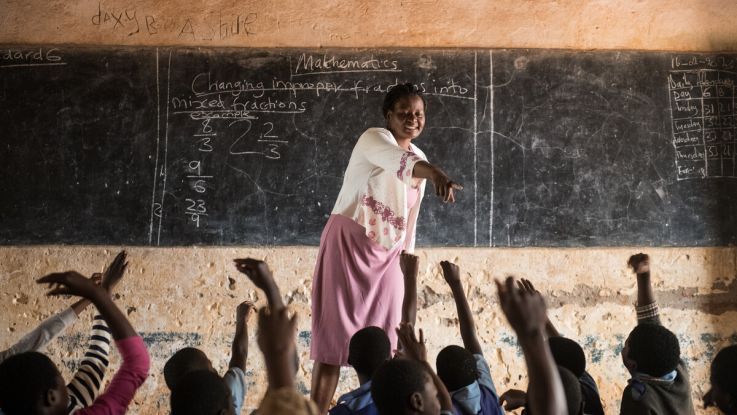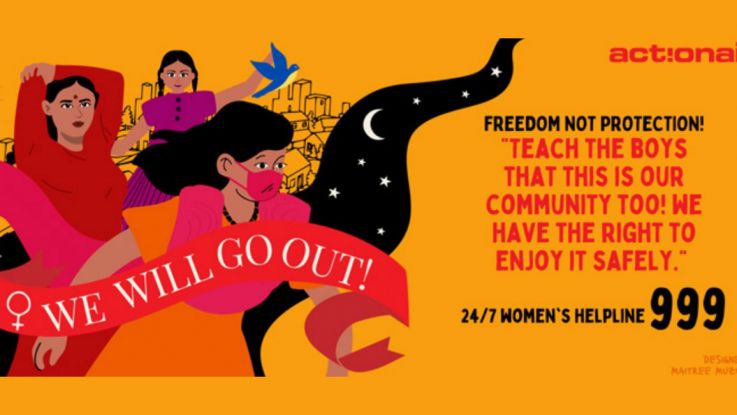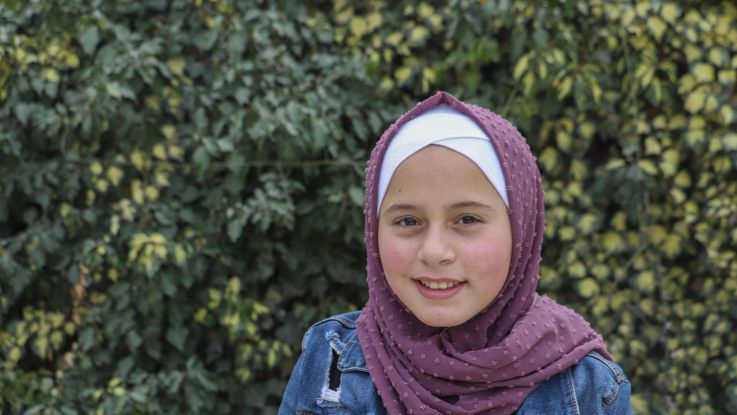How is Covid-19 affecting girls around the world?
21 May 2020
The coronavirus pandemic is not a great equaliser as some have claimed. Find out how it has increased the burden of care, given rise to violence and widened the gap in education for the most vulnerable girls around the world.
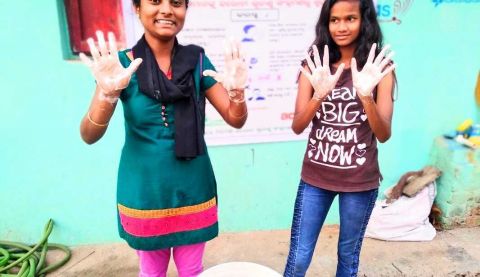
All over the world, girls' rights are at risk due to the Covid-19 pandemic. Photo: ActionAid
Covid-19 has changed all of our lives in ways that were unimaginable only a few weeks ago.
The coronavirus pandemic has affected communities across the world – the school closures, increased pressures on health care, increased care responsibilities at home and in communities, and the emotional and mental health impacts of social distancing have reshaped all of our lives.
This pandemic has reminded us that we are all connected, and that to be well and healthy we depend on others, and on our communities.
This pandemic, is not however, a ‘great equaliser’ as some celebrities and politicians have suggested.1
In fact, unequal systems of power double down in a crisis.
Women make up 70% of health and social workers worldwide2 , working on the front lines of this pandemic to protect us all.
Ethnic minority groups in the UK and elsewhere are experiencing higher per capita deaths from Covid-19.3
Girls around the world, particularly the most marginalised girls, too often bear the biggest burden in times of crisis and disaster – with widening gaps in education, increased risk of violence and increasing care responsibilities at home exacerbating existing inequalities.
And activists and women’s organisations have done well to remind us, violence against women and girls has always been a pandemic. Now we are seeing compelling evidence that lockdown, and reduced access to services has only increased the rates and severity of violence that women and girls are facing in their own homes4 .
And girls around the world, particularly the most marginalised girls, too often bear the biggest burden in times of crisis and disaster – with widening gaps in education, increased risk of violence and increasing care responsibilities at home exacerbating existing inequalities.
How Covid-19 affects girls' education
Almost 90% of schools worldwide are currently closed.
School closures are of course in place to protect everybody’s health. Short term closures are in place so that fewer people may get sick, and that everyone will eventually return to school and catch up on the work they have missed.
For many girls however, there is a risk that this will not be a short-term measure, and recent analysis from the Malala Fund suggests that up to 10 million more secondary school-aged girls could be out of school after the pandemic has passed.5
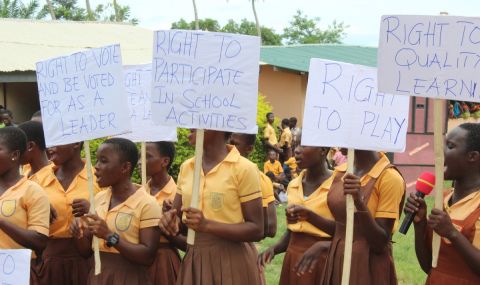
Girls in Ghana protesting for their rights and equality. Photo: Abu Alhassan/ActionAid
We saw this after the 2014 Ebola outbreak in West Africa, when the gender gap in education widened, with many girls not re-enrolling even after schools opened.6
In families where less money is coming in due to the crisis, girls can often be expected to pick up additional work at home, contribute to household income, or to care for younger children – and these responsibilities are often prioritised above returning to school.7
There was also spike in teenage pregnancies and exploitation of girls during and after the Ebola outbreak8 , and many of these girls were then prevented from returning to education once the crisis passed.
During the Covid-19 pandemic, several organisations and schools have been quick to try and plug the educational gap using digital devices and online learning so students can keep up with their education while in lockdown.
But for many girls, access to these digital devices can be difficult.
This was exacerbated by educational policies in some countries such as Sierra Leone, where pregnant girls were banned from returning to school.
Campaigners and activists in Sierra Leone were successful in challenging that ban last year9 , but other countries, such as Tanzania have similar policies10 – if these remain in place after the coronavirus crisis they will provide a further barrier to girls achieving educational parity with their male peers.
During the Covid-19 pandemic, several organisations and schools have been quick to try and plug the educational gap using digital devices and online learning so students can keep up with their education whilst in lockdown.
But for many girls, access to these digital devices can be difficult. They may not have devices in their family at all; boys access could be prioritised over girls' access, if there is only one device; and there is also some evidence that fears about girls' safety and gendered social norms impact how much access girls are allowed access compared to boys.11
In Liberia, the Ministry of Education have been broadcasting lessons over local community radio – creating opportunities for girls to continue learning and ensuring that some learning is reaching the most marginalised girls.12
How coronavirus is affecting Girls' Clubs and safe spaces
For many, Girls' Clubs provide systems of support, particularly for the most marginalised – they act as a vital connection between girls and essential services in communities, provide a source of information on their rights, and build their self-confidence and life skills.
Girls who attend these clubs are also more likely to stay in school and to have useful skills for employment in the future.
Like schools, most of these clubs are on hold during the current crisis, but they can provide important support for girls both during and immediately after.
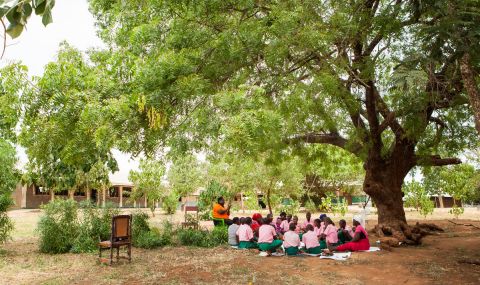
We’re supporting local Girls’ Clubs like these in Kenya so girls stay informed about their rights and have access to vital services. Photo: ActionAid
Existing Girls' Clubs and girl's mentors can continue to check in with girls via text messaging or phone calls.
For example, in Ghana, the Young Female Platforms project organises Girls' Clubs where adolescent girls and young women participate in skills development, peer sharing activities, discussions and advocacy to actively participate in leadership and decision-making processes in their schools and communities.
Due to lockdown measures, they are now conducting sessions for girls remotely, and continuing to check in with girls during this period.
Girls' Clubs will already know which girls in their communities are most at risk and can follow up with messages about re-enrolment.
Current Girls' Clubs' projects can also ensure that information about hotlines and online services are well-distributed and that information is shared in a girl-friendly and accessible way.
For example, distributing dignity kits that also include information about numbers for childline services and for shelters that girls may need in an emergency.
The ActionAid project, Not Any Girl in Kenya has started distributing dignity kits to girls through their Girls' Club network, ensuring they have access to basic supplies, including menstrual products (as periods don’t stop in a pandemic).
Immediately after the lockdown, networks of Girls' Clubs and safe spaces could also provide a vital bridge to ensure that girls get back to school.
Girls' Clubs will already know which girls in their communities are most at risk and can follow up with messages about re-enrolment.
Support at the clubs will also help to ensure that girls can catch up on education they missed during the crisis, re-establish their peer support networks, and nurture their aspirations.
After the Ebola outbreak, communities with established Girls' Clubs and sensitization efforts on girls' education, saw that fewer girls experienced adverse effects on their education.13
How violence against girls is increasing during Covid-19
Grassroots organisations and activists have been sounding the alarm that the harmful practices that impact girls such as child marriage and female genital mutilation are increasing whilst schools are closed.14 15
New analysis from United Nations Population Fund (UNFPA) suggests that, based on past trends, there is a risk that due to a pause in prevention work and community activities, an additional 2 million FGM cases could occur over the next decade that would otherwise have been prevented.16
Increasing rates of domestic violence are also affecting girls in the home. Annet Shivachi, from our partner organisation Khwisero Disability Network in Kenya has observed a trend of ‘absentee fathers’ returning during the crisis; and children witnessing increasing levels of domestic violence in the home as a result.
The national administration of justice in Kenya reported a ‘significant spike’ in sexual offences across the country in the weeks following lockdown, with many of these incidents occurring at the hands of close relatives and guardians.17
During lockdown, ActionAid projects can support the strengthening of child protection systems at community level.
They can broaden the use of mass media to promote prevention messages on child marriage, FGM and other harmful practices; they can work with women’s groups and other networks at community level to stay in touch with girls; and they can monitor the situation, and make sure that girl-friendly messages about available services are reaching girls.
ActionAid is working with women’s rights organisations to provide a network of support for girls who are at risk of violence.
Girls' leadership and resilience during times of crisis
In times of crisis we often focus on how to protect girls – this is vital, and we must do more to make sure that girls are not forgotten.
But it is also important to remember that in such times, girls demonstrate their resilience, leadership and brilliance, and we need to support their voices and ensure their solutions are listened to.
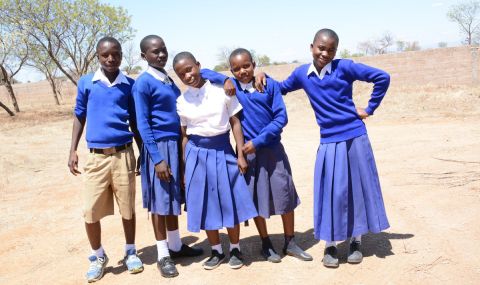
ActionAid works in Tanzania to empower young girls. Photo: Richard Meshack/ActionAid
In Ghana, The Young Female Platforms run by ActionAid have provided a space for girls to discuss and advocate for their rights.
Girls from these platforms have now asked to use their campaign funds to inform their communities about Covid-19, demonstrating true leadership, and showing that girls must always be part of the solution.
How we can help further
As the Covid-19 pandemic develops we must ensure that we are building protective environments for girls where their safety is prioritised, that we are amplifying their voices, funding their solutions, and championing girls' rights and freedoms.
During and after the Covid-19 crisis it is more important than ever that we work to ensure girls are visible, and that they can live with freedom, dignity, and safety.
How you can help
ActionAid is on the frontline of the coronavirus crisis helping to stop the spread and save lives as the pandemic hits the world’s poorest countries.
From Italy to India, Liberia to Kenya, local ActionAid-supported women’s groups are distributing life-saving advice, health information and hygiene kits to vulnerable communities.
We are also distributing food packages and essential supplies, working to stop violence before it happens, and provide support to women and girls who are affected. Please donate now to help us reach people in urgent need.
Footnotes
- 1https://www.independent.co.uk/arts-entertainment/music/news/madonna-coronavirus-nude-bathtub-covid-19-instagram-fried-fish-a9417441.html
- 2https://apps.who.int/iris/bitstream/handle/10665/311314/WHO-HIS-HWF-Gender-WP1-2019.1-eng.pdf
- 3https://www.bbc.co.uk/news/uk-52492662
- 4https://www.unwomen.org/en/news/stories/2020/4/statement-ed-phumzile-violence-against-women-during-pandemic
- 5https://downloads.ctfassets.net/0oan5gk9rgbh/6TMYLYAcUpjhQpXLDgmdIa/dd1c2ad08886723cbad85283d479de09/GirlsEducationandCOVID19_MalalaFund_04022020.pdf
- 6The Malala Fund, Girls Education and COVID 19.
- 7https://www.amnesty.org/en/latest/news/2015/11/sierra-leone-pregnant-schoolgirls-excluded-from-school-and-banned-from-exams/
- 8https://medium.com/@WITHandFORgirls/covid-19-and-girls-rights-a-series-e68f21ddda60
- 9https://www.theguardian.com/global-development/2019/dec/13/sierra-leone-ordered-to-revoke-ban-on-pregnant-schoolgirls
- 10 https://www.theguardian.com/global-development/2020/apr/10/tanzania-to-ease-education-ban-on-pregnant-girls-but-not-in-classrooms
- 11https://www.unicef.org/publications/files/SOWC_2017_ENG_WEB.pdf
- 12 https://www.aljazeera.com/news/2020/04/liberia-takes-classes-airwaves-covid-19-pandemic-200415203012448.html
- 13https://downloads.ctfassets.net/0oan5gk9rgbh/6TMYLYAcUpjhQpXLDgmdIa/dd1c2ad08886723cbad85283d479de09/GirlsEducationandCOVID19_MalalaFund_04022020.pdf
- 14https://www.ippmedia.com/en/features/fgm-being-practiced-mugumu-ngo
- 15https://www.endfgm.eu/news-en-events/news/covid-19-pandemic-putting-girls-at-high-risk-of-fgm-in-kenya/
- 16https://www.unfpa.org/resources/impact-covid-19-pandemic-family-planning-and-ending-gender-based-violence-female-genital
- 17https://www.hrw.org/news/2020/04/08/tackling-kenyas-domestic-violence-amid-covid-19-crisis
Read next
-
The links between gender-based violence and the economy
11 December 2023
-
How has patriarchy affected girlhood?
9 October 2023
-
Back to school: How the earthquakes are disrupting education for Syrian girls
8 September 2023


